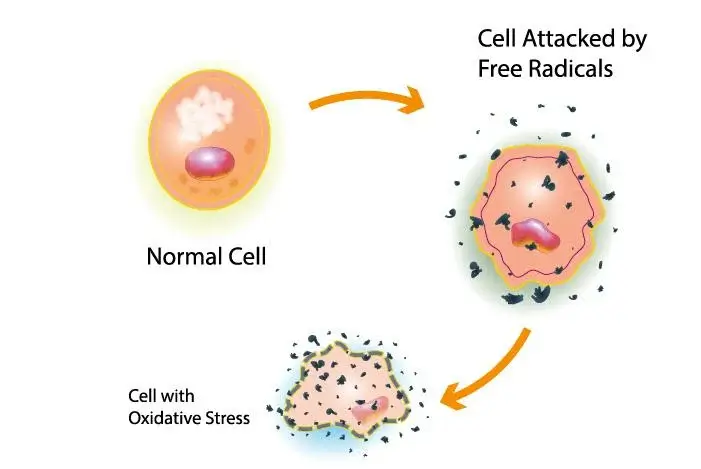Role of Oxidative Stress in Diabetes

Oxidative stress is referred to the excessive production of free radicals which in turn damage lipids, proteins, and DNA. This leads to a disturbance in the balance of anti-oxidants and free radicals in the body.
Free radicals are chemical entities that are reactive with one or more unpaired electrons. Factors such as ageing, toxicity, drug actions, inflammation and addiction contribute to oxidative stress. Antioxidants are responsible for the removal of free radicals, reducing oxidative stress and thereby, stress-causing diseases.

Some of the signs given below should make one think of having high levels of oxidative stress in the body-
- Chronic Fatigue (Even after a good night’s sleep)
- Loss of memory (Frequent Episodes)
- Frequent Infections and Inflammatory conditions
- Brain Fog
- Early wrinkles, Ageing, and Gray hairs.
Causes of Oxidative Stress in Diabetes
The overproduction of free radicals (leads to oxidative stress) leads to many diseases including diabetes. This oxidative stress makes the healthy cells of the body lose their functions while attacking their structure. The Imbalance between free radicals and antioxidants can lead to many health conditions and diabetes is one of them. Also, it is now widely believed that oxidative stress plays a significant role in the development of vascular complications in diabetes, particularly type 2 diabetes.
Our body produces free radicals in response to exercise, and certain food and drink, for example, having daily booze can cause an increase in free radicals. Other than this, smoking, pollution, pesticides and radiation can elevate the levels of free radicals in your body.
The table below signifies that oxidative stress almost impacts every organ of the body.
| Organ | Condition |
| Lungs | Asthma, chronic bronchitis |
| Pancreas | Diabetes |
| Joints | Arthritis, Rheumatism |
| Eyes | Cataract, Retinal diseases |
| Heart | Arteriosclerosis, Hypertension, Ischemia, Cardiomyopathy, Heart failure |
| Multiple-organs | Cancer, Diabetes, Inflammation Infection, Aging |
| Kidneys | Glomerulonephritis, Chronic renal failure |
| Brain | Alzheimer’s disease, Parkinson’s disease, Memory loss, Depression, Stroke |
Effects of Oxidative Stress in Diabetes
Oxidative stress has a major role in the development of diabetes complications, both at microvascular and cardiovascular levels. Other than from the endogenous anti-oxidant system, the human body gets anti-oxidants from a diet that neutralizes free radicals to maintain homeostasis of the body.
Also, to combat this oxidative stress, Ayurveda puts a huge impetus on balancing the right meals with the right carrier in the right season which is currently a huge miss in the modern-day lifestyle around us. The modern lifestyle, the urge to stay productive, and pressurized make us susceptible to perennial stress all the time which increases the levels of cortisol (stress hormone) in our body and oxidative stress.
Cortisol (stress hormone) impairs the effect of Insulin, thereby raising blood sugar levels by releasing stored glucose in the liver. Now you can conclude why staying stressed all the time can lead to high blood glucose levels in the body and this can make you a patient of type 2 diabetes. Keeping stress levels in check is very important in modern-day testing and tiring times.
The studies tell us that oxidative stress does inference in diabetes pathogenesis by the alteration in enzymatic systems, lipid peroxidation, impaired Glutathione metabolism, and decreased Vitamin C levels, Lipids, proteins, DNA damage, Glutathione, catalase, and superoxide dismutase are various biomarkers of oxidative stress in diabetes mellitus.
It is believed that in the onset and progression of late diabetic complications, free radicals have got a major role due to their ability to damage lipids, proteins and DNA.
The excessive formation of free radicals and oxidative stress induces complications of diabetes mellitus including coronary artery disease, Diabetic Neuropathy, Diabetic Nephropathy, and Diabetic Retinopathy. This proves that diabetes doesn’t come alone but is a precursor of so many worsening medical conditions waiting to appear in a diabetic’s life in the later years of life.
Preventive Measures to Minimize Oxidative Stress
- Wholesome Living: Adopting a healthy lifestyle such as doing regular pranayama and consuming anti-inflammatory food devoid of refined sugar, and processed fat-free meals help greatly in reducing oxidative stress and body inflammation. Regular practice of pranayama makes more bio-cellular availability in the body cells that helps in reducing oxidative stress.
- Aahar, Vihar, and Ausadh: Ayurveda focuses on treatment with its 3 pillars approach of Aahar (diet), Vihar (lifestyle) and Ausadh (Medicines). Consuming vegetables such as carrots that are rich in carotene can supply a good amount of anti-oxidants in the body fighting oxidative stress. Similarly, organic green veggies from the gourd family should be consumed in good quantity which unfortunately the modern world is forgetting.
- Ayurvedic Medicines: Ayurveda medicine herbs are also major sources of antioxidants, one such example is Triphala, which is in use for centuries and has been shown to have immense potential to boost antioxidant activity. It kills free radicals, restores antioxidant enzymes and non-enzyme levels, and decreases lipid peroxidation. Similarly, Aamla, Ashwagandha and Haridara are also known to have huge anti-oxidant properties. The judicious use of these herbs under the guidance of an Ayurveda physician skilled in diabetes reversal can help in curing/reversing/managing diabetes mellitus.
Conclusion
This blog is leaned more towards the impact of oxidative stress in developing diseases in our body, more so specifically diabetes and its complications. Modern science with modern research has helped us greatly in knowing the pathophysiology and management of medical conditions, but still, there is a big lacuna to address the modern world diseases with modern medicines which makes a patient drug dependent always.
During the many studies, oxidative stress has been demonstrated in the progression of diabetes which plays an important role during diabetes, including impairment of insulin action along with the elevation of the incidences of complications. The utility of antioxidants has already been established in the treatment of both diabetes type 1 and type 2.
Thus, oxidative stress seems to be more worrying in metabolic disorders especially diabetes mellitus or type-2 diabetes. So, it becomes imperative to keep the causes of oxidative stress at bay while and choose holistic health modalities that include a healthy diet, and lifestyle even if you are some Ayurveda or modern medicines.






